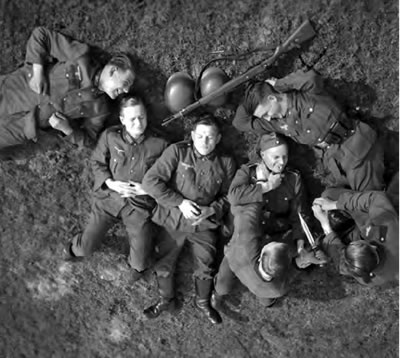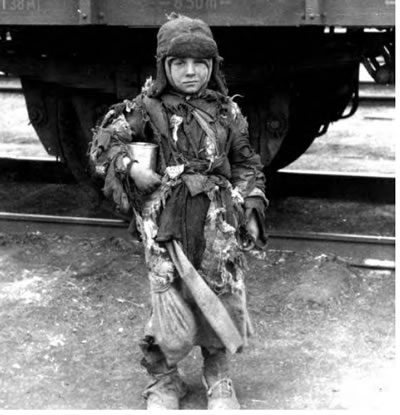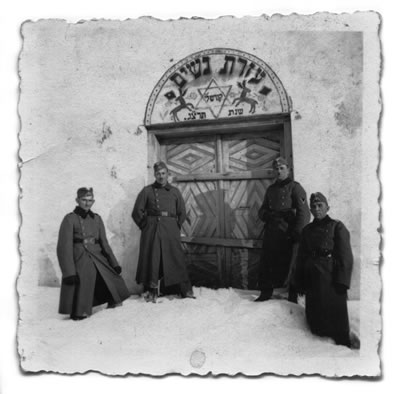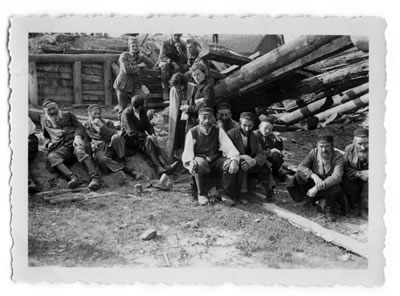Search our Archives:
» Home
» History
» Holidays
» Humor
» Places
» Thought
» Opinion & Society
» Writings
» Customs
» Misc.
|
Album of the Damned
By Paul Garson
Welcome to the Third Reich
As Seen Through the Camera
Lens of German Soldiers and
Civilians.
Gathered from more than a
dozen countries, Album of the
Damned contains nearly 400
photographs, only a handful ever
seen before. For the most part,
they were taken by German
soldiers and civilians – snapshots,
souvenirs for friends and family.
They comprise a unique,
personal and fundamentally
disturbing record which is, at
turns, compassionate, chilling,
malevolent, and as twisted as the
swastika itself. Through these
pictures, we step into the living
rooms, the backyards, the
boulevards, and the battle fields of Nazi Germany.
Many of these snapshots were once in family albums and later offered for
sale; others were captured by the Soviets and came onto the open market
after the fall of the USSR.
Here we look into the eyes and the lives of soldiers and civilians and ask
ourselves – How could such ordinary people be capable of such
extraordinary evil?
“Explaining is not excusing; understanding is not forgiving. Not trying to
understand the perpetrators in human terms would make impossible not
only this study but any history of Holocaust perpetrators that sought to go
beyond the caricature.”
The names of both the individuals behind the cameras and their subjects
remain unidentified… lost. However, these images, like the indelible effects
of the War, will never really fade away…
The Aryans
Nazi ideology instituted the concept of a racial hierarchy that placed the
Aryan in the position of ultimate superiority and the world’s rightful
master race, all others subservient.
Who Dressed the SS?

Designing the Uniform
“Well, it was so theatrical. You know, I guess pure evil...whoever designed the Nazi’s
uniforms was a theatrical genius. And the German cause was pure evil, that’s all
there was to it. I don’t think there’s been another war like that.”
– Kurt Vonnegut
War Games

Playing War Games
German soldiers often photographed each other acting out scenes that gave
a new meaning to the term “war games,” their “toys” razor sharp daggers.
These young recruits have turned their weapons upon each other, and
though “practicing” for the battles to come, the image presages the eventual
self-implosion of the Third Reich upon its own people.
POW Mosaic

Prisoners of War
When the Germans launched Operation Barbarossa on June 22, 1941 the
offensive advanced so quickly millions of Soviet prisoners were captured.
Surrounded by barbed wire in the middle of the Russian vastness, guarded
by a few soldiers and left to starve to death, an estimated 2,600,000-
10,000,000 Russian POWS perished.
Waiting for Transport
On the back of the photo, taken by an unknown German soldier, a
handwritten notation tells us the boy was staring into a German camera
sometime in August, 1942, well into the mass extermination period when
trains from all over Europe rolled toward the death camps.

Waiting for the Transport
By the end of the war 1,500,000 Jewish children had died. Of that toll,
cattle cars had transported 216,000 to Auschwitz. 451 survived to be
liberated.

Doing the bidding of the leader
“The People can always be brought to the bidding of the leader.”
– Herman Goering
The Nazi Party promised the German people a Thousand Year Reich,
dominance over Europe and eradication of their enemies. In the end the
promises turned to bitter ashes, destruction and death consuming hundreds
of thousands of children, their own included.

Breakfast Transformation
Clad in pajamas, this man concentrates on Mein Kampf, his wife standing by dutifully. Munich circa 1930, perhaps.

Polish Synagogue
Waiting for their souvenir photo to be snapped, four soldiers of the German army stand in the snow before the doorway to an orthodox Jewish house of worship in Poland. They no doubt can’t read the Hebrew inscription that indicates this particular door is reserved for the entry of female worshippers. Images of gentle deer decorate the doorway lentil, doors that will never again open for the synagogue’s congregation. The patterns on the wooden doors seem to form two large eyes staring out at the camera. On the back of the photo is the date, February 20, 1940, a Tuesday, some six months since Germany invaded the country. The name of the town is recorded but the handwriting is difficult to decipher although it begins with “Synagogue im Przjsnc...”

Labor Camp
A portrait of Polish Jews, apparently newly arrived as their clothes are relatively neat and clean, are captured by a German cameraman while his fellow soldiers, unarmed, loll casually in the background. One well-dressed woman glares at the camera.
For more information, contact: Jordan Miller or Jacob Schroeder, 363 West Erie Street, 7th Floor East, Chicago , IL , 60610 Phone: 312-751-7300, Fax: 312-751-7306 www.academychicago.com
~~~~~~~
from the November 2008 Edition of the Jewish Magazine
|
|
Please let us know if you see something unsavory on the Google Ads and we will have them removed. Email us with the offensive URL (www.something.com)
|
|










